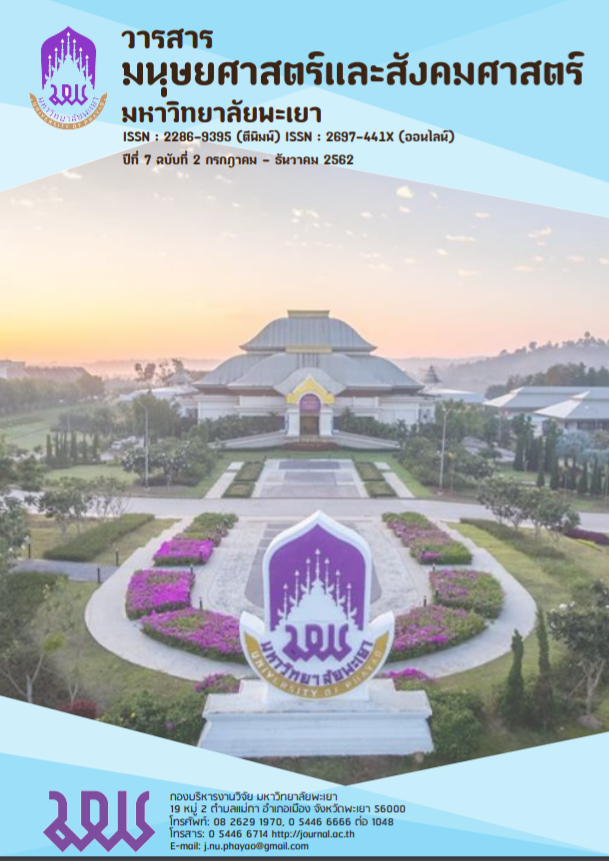Guidelines for Capacity Networking of Scuba Business for Sustainable Tourism
Keywords:
Tourism, Sustainable Tourism, Scuba Diving, Scuba Business NetworkAbstract
This research paper aims to propose the guidelines for capacity networking of Scuba business for sustainable tourism. It employs both quantitative and qualitative research method to study 3 areas of diving activity in Thailand; which are 1) Koh Tao, Surat Thani Province; 2) Koh Lan, Chonburi Province; and 3) Koh Raja, Phuket Province.
The Existing situation of Scuba business networking in the studied areas are different. The network in Koh Tao is the most related with tourism in terms of accommodation, restaurant, and other small business. It is also more potential in terms of amenities, particularly in medical and security services. Both of services are necessary service for Scuba diving tourism activity; due to the activity is high risk of accident and incident from its procedure and equipment, as well as the natural condition.
The guidelines for capacity networking of Scuba business for sustainable tourism are 1) the use of social measures prior the legal measure; 2) the development of Marine Watch Dog network from the existing Scuba business network; 3) the initiatives of Scuba tourism standard; 4) the policy of cross-sectoral collaboration among private, public, and local agencies in Scuba tourism; 5) the capacity building and development for sustainable development, together with knowledge-based community in marine resources and its utilization; 6) the promotion of local dive leader and tour guide for Scuba diving in Thailand.
References
กรมการท่องเที่ยว. (2552). คู่มือการประเมินมาตรฐานคุณภาพแหล่งท่องเที่ยวทางธรรมชาติประเภทเกาะ. (พิมพ์ครั้งที่ 2). กรุงเทพฯ : สำนักงานพัฒนาบริการท่องเที่ยว กรมการท่องเที่ยว.
กรมการท่องเที่ยว. (2556). มาตรฐานกิจกรรมดำน้ำ (Diving Standard). กรุงเทพฯ : สำนักงานพัฒนาบริการท่องเที่ยว กรมการท่องเที่ยว.
กรมทรัพยากรทางทะเลและชายฝั่ง. (2556). ระบบฐานข้อมูลกลางและมาตรฐานข้อมูลทรัพยากรทางทะเลและชายฝั่ง. <http://marinegiscenter.dmcr.go.th/> (สืบค้นเมื่อ 12 สิงหาคม).
กรมอุทยานแห่งชาติ สัตว์ป่า และพันธุ์พืช. (2551). แนวทางและมาตรการสำหรับผู้ประกอบการในอุทยานแห่งชาติทางทะเล (การดำน้ำและกิจกรรมอื่น ๆ ที่เกี่ยวข้อง). <http://www.dnp.go.th/Rules/seatrade_th.pdf> (สืบค้นเมื่อ12 สิงหาคม).
กัลยา วานิชย์บัญชา. (2544). การใช้ SPSS for Windows ในการวิเคราะห์ข้อมูล. (พิมพ์ครั้งที่ 4). กรุงเทพฯ : โรงพิมพ์ห้างหุ้นส่วนจำกัด ซี เค แอนด์ เอส โฟโต้สตูดิโอ.
กัลยา วานิชบัญชา. (2545). การวิเคราะห์สถิติ สถิติเพื่อการตัดสินใจ. (พิมพ์ครั้งที่ 5). กรุงเทพฯ : จุฬาลงกรณ์มหาวิทยาลัย.
ดรรชนี เอมพันธุ์. (2557). แนวคิดและหลักการจัดการทรัพยากรท่องเที่ยวและนันทนาการ.<http://www.dpt.go.th/csp/images/stories/pdf/G_plan4/rcc_2557.pdf> (สืบค้นเมื่อ 7 สิงหาคม).
ปรารถนา สถิตย์วิภาวี, พิจิตรพงศ์ สุนทรพิพิธ, ศิราณี ศรีใส, ชูเกียรติ วิวัฒน์วงศ์เกษม, ฉัตรภา หัตถโกศล และ ศุภากร รัชพงศ์. (2556). โครงการศึกษาการพัฒนาศักยภาพด้านการจัดการพื้นที่และทรัพยากรเพื่อการส่งเสริมการท่องเที่ยวอย่างยั่งยืน. กรุงเทพฯ : สำนักงานเลขาธิการวุฒิสภา.
พยอม ธรรมบุตร. (2549). เอกสารประกอบการเรียนการสอนเกี่ยวกับองค์ประกอบของการท่องเที่ยว. กรุงเทพฯ : สถาบันพัฒนาการท่องเที่ยวเชิงอนุรักษ์ มหาวิทยาลัยศรีนครินทร์วิโรฒ.
เมืองพัทยา. (2555). ข้อมูลเมืองพัทยา. <http://www.pattaya. go.th/city-information/เกี่ยวกับพัทยา/ข้อมูลเมืองพัทยา/> (สืบค้นเมื่ 5 กันยายน).
ลัฆวี ปรีชัย. (2557). การจัดการมูลฝอยบนเรือและท่าเทียบเรือจากกิจกรรมบริการท่องเที่ยวดำน้ำลึกบริเวณหมู่เกาะราชา ที่ขึ้นฝั่ง ณ ท่าเทียบเรืออ่าวฉลอง อำเภอเมือง จังหวัดภูเก็ต. วิทยานิพนธ์ปริญญาโท หลักสูตรเทคโนโลยีและการจัดการสิ่งแวดล้อม, มหาวิทยาลัยสงขลานครินทร์.
สุชาย วรชนะนันท์, ภาสิณี วรชนะนันท์, มนต์ชัย พินิจจิตรสมุทร และ วินัย พุทธกุล. (2555). รายงานวิจัยฉบับสมบูรณ์ศักยภาพการพัฒนาและแนวทางการจัดทำแผนยุทธศาสตร์การท่องเที่ยวแหล่งดำน้ำที่มนุษย์สร้างขึ้นอย่างยั่งยืนในเขตพัทยา. กรุงเทพฯ: สำนักงานคณะกรรมการวิจัยแห่งชาติ.
สุพักตรา สุทธิสุภา. (2558). การรับรู้เกี่ยวกับการพัฒนาในรูปแบบสร้างสรรค์สีเขียวอย่างยั่งยืน: การศึกษาเบื้องต้นในเกาะเต่า จังหวัดสุราษฎร์ธานี. การประชุมวิชาการระดับชาติ “สถาปัตย์กระบวนทัศน์.
สำนักปลัดกระทรวงการท่องเที่ยวและกีฬา. (2558). รายงานฉบับสมบูรณ์ (Final Report) โครงการสำรวจทัศนคติและความพึงพอใจของนักท่องเที่ยวชาวต่างชาติที่เดินทางท่องเที่ยวในประเทศไทย. <http://secretary.mots.go.th/policy/download/SurvayAttitude2015/1InnerFinalReportAttitude2015.pdf> (สืบค้นเมื่อ 3 พฤษภาคม).
สำนักงานคณะกรรมการพัฒนาการเศรษฐกิจและสังคมแห่งชาติ. (2554). แผนพัฒนาเศรษฐกิจและสังคมแห่งชาติฉบับที่สิบเอ็ด พ.ศ. 2555 - 2559. <http://www.nesdb.go.th/Portals/0/news/plan/p11/plan11.pdf> (สืบค้นเมื่อ 23 กรกฎาคม).
สำนักงานปลัดกระทรวงการท่องเที่ยวและกีฬา. (2558). แหล่งดำน้ำที่สำคัญในประเทศไทย. กรุงเทพฯ : กระทรวงการท่องเที่ยวและกีฬา.
สำนักปลัดเทศบาล เทศบาลตำบลราไวย์. (2556). แผนยุทธศาสตร์การพัฒนา (พ.ศ. 2557 – 2561). ภูเก็ต : งานวิเคราะห์นโยบายและแผน.
Dickman, S. (1996). Tourism: An Introductory Text (2nd ed.). Sydney: Hodder Education.
Jones E. and Haven-Tang C. (2005). Tourism SMEs, Service Quality, and Destination Competitiveness. Trowbridge: Cromwell Press.
Leiper, N. (1990). Tourism System: An Interdisciplinary Perspective. Palmerston North: Department of Management Systems, Massey University.
Mill, B. C., & Morrison, A. M. (Eds.). (2009). The Tourism System (6th ed.): Kendall Hunt Publishing.
Oram, M.B. (1999). Marine tourism. London: Routledge Publishers.
Ritchie B. and Crouch G. (2003). The Competitive Destination: A Sustainable Tourism Perspective. Massachusetts: CABI Publishing.
Robinson, P. (Ed.). (2012). Tourism : The Key Concepts. New York: Roudege.
ScubaBoard. (2011). Technical Versus Recreational SCUBA Diving: Why Is There a Need for Rules, Boundaries and Limitations? http://www.scubaboard.com (สืบค้นเมื่อ 19 กันยายน).
United Nations. (2012). The Future We Want. http://www.un.org/disabilities/documents/rio20_ outcome_document_complete.pdf (สืบค้นเมื่อ 3 พฤษภาคม).
Downloads
Published
How to Cite
Issue
Section
License
ผู้นิพนธ์ต้องรับผิดชอบข้อความในบทนิพนธ์ของตน มหาวิทยาลัยพะเยาไม่จำเป็นต้องเห็นด้วยกับบทความที่ตีพิมพ์เสมอไป ผู้สนใจสามารถคัดลอก และนำไปใช้ได้ แต่จะต้องขออนุมัติเจ้าของ และได้รับการอนุมัติเป็นลายลักษณ์อักษรก่อน พร้อมกับมีการอ้างอิงและกล่าวคำขอบคุณให้ถูกต้องด้วย
The authors are themselves responsible for their contents. Signed articles may not always reflect the opinion of University of Phayao. The articles can be reproduced and reprinted, provided that permission is given by the authors and acknowledgement must be given.








